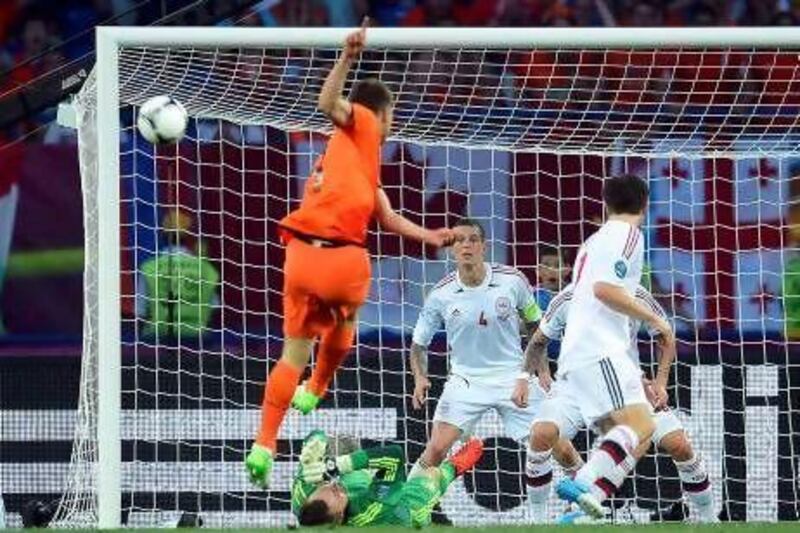Sometimes what keeps me up at night is the goals that weren't scored. This isn't always because of any parochial regret - though there are those - and in fact, it usually isn't even a regret. Usually it is in appreciation of the goal not having been scored.
Not a week old yet and the European Championship has already provided one such non-goal for many nights. It came during Denmark's upset of Holland, the Dutch striker Klaas-Jan Huntelaar, the man who didn't score. Put through one-on-one, he should have, but had he done so, having just come on, the goal would have overshadowed the pass from Wesley Sneidjer that created the opportunity.
Sneidjer had a busy game until that 74th minute, doling out assists like a one-man welfare state, but this was something else. Flicked with the outside of his right foot from a little inside the Danish half, the ball in-swung through the air eliminating five Danish players from the equation altogether to leave Huntelaar alone with the keeper.
Not too distant a relative to the pass Juan Sebastian Veron once provided - along the ground - for Ole Gunnar Solskjaer against Deportivo La Coruna, Sneijder's was such an immense conjoining of vision, technique and execution that a goal would have been mere frippery. Such creations should be allowed to exist on their own, not reduced to the status of an assist for an equaliser, a winner or a consolation.
Any list of the best goals is actually just a subjective compilation of someone's favourite goals, just as any list of the goals that almost were. Criteria, other than that they are not goals, is flexible and loosely applied.
Sometimes the almost goal is a window to a parallel world. In that world, when Matt Le Tissier was flipping the ball up with his right foot to skip a tackle against Romania in October 1994 and then volley with his left from more than 30 yards out, he would have scored in his fourth game for England. He would then have vanished away his lack of confidence in an England shirt and unleashed the impudent genius of his Southampton club shirt to become one of the greatest players the world had ever seen.
In the real world, the outrageous attempt, orchestrated almost as ballet, went narrowly over, Le Tissier never scored for England and played only four more games for them. Because it never was, possibilities float in the imagination, which is where after all, the greatest life is lived.
Others bring a peculiar and perverse satisfaction, such as when Pele nearly scored from his own half against Czechoslovakia in the 1970 World Cup. According to the coach Mario Zagallo the attempt was likely a response to the previous coach Joao Saldanha who, after a dispute with the star, began to spread rumours Pele was going blind.
Despite the motive, it feels good he missed - that and the equally celebrated dummy on the goalkeeper against Uruguay two weeks later - if only to allow the smug relief that some things even Pele could not pull off.
Others are personal ones, landmarking a relationship with the game. In an exhibition game in Saudi Arabia after the 1986 World Cup, Maradona briefly twisted my mind-eye coordination by nearly lobbing the goalkeeper with what looked like the Rabona, when the kicking leg comes around the back of the standing leg to shoot.
An 18-year-old Diego Simeone was denied only by the bar in a World Youth Championships in the same country in 1989, but the attempt, driven from the halfway line, felt scarcely believable in the first instance. And until seeing an overhead kick by the legendary Algerian Rabah Madjer strike the outside of a post in a game in the 1990 African Cup of Nations, I didn't believe it could be executed with grace or accuracy.
Taken as a whole, there is probably some lesson to be learnt from this general air of incompleteness. Something about not always getting what you want and instead learning to appreciate the effort in striving for it; life being a journey, not a destination; the bottom line not always dictating; embracing the ambiguity of not succeeding, but not failing, and all that.
That, though, is probably getting far deeper into the matter than might actually be necessary.
Follow us
[ @SprtNationalUAE ]





